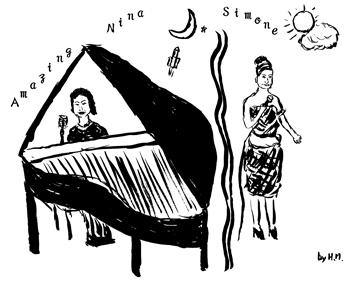

While there are less 'junk' female singers and I've been reluctant to write about 'charm of croonesses' because women are likely to have a wider range of voice than men, I venture to write about a woman "who let a child stop weeping", gracious Nina Simone. The very first impression of her is no less than difficult for many people, I guess, and frankly speaking, I must admit that I had avoided listening to her music. But I was involved in the depth of her world when I settled myself to listen to it. The best "Anthology", strangely released just after her death and collecting her recordings released by each label in the U.S. mainly from her debut 1957 to 1971, was thankful for a beginner like me.
Two hit songs from her first album "Jazz as Played in an Exclusive Side Street Club" (later retitled as "Little Girl Blue") recorded at a label Bethlehem, I Loves You, Porgy and My Baby Just Cares for Me are already wonderful, and accompanied with simple performances in these songs her low alto voice and excellent piano vibrate confortably (one of the U.K. compilation "The Essential Collection" contains all of this album's tunes in shuffled order). At the next label Colpix, she had a lot of live recordings selected from a wide diversity of music including standard jazz, gospel and blues, and her vocal and piano reach our ears with strained atmospheres. Especially I give up on the beautiful delivery of The Other Woman. At the label Philips in the mid-'60s, the ages of the Civil Rights Movement, she sang and wrote songs of social awareness. Among these songs I am overwhelmed by Mississippi Goddam which she wrote after the murders in the South. It starts with the uptempo popular-song-like melody and then it goes through the intensity far surpassing most of rock sides. Since her voice is so stable that it never shivers even in front of the most terrible horror, I wonder if there can be quite a few who express themselves as well as her in live performances. And Four Women, on which Nina sings about sufferers with simple lyrics, strikes me by her revealing fierce emotion. When she moved to RCA, she became to sing R&B or soul tunes. Besides many not-jazz ones like Revolution, Here Comes the Sun (Beatles), Just Like a Woman (Bob Dylan), she shows her broadness of music on the sexy I Want a Little Sugar in My Bowl or To Be Young, Gifted and Black with chorus 'solidarity'. It is tough to enjoy her sound world.
Eager fans might say to me, like "Don't talk about Nina Simone without knowing this album !" or "Don't show your shallow knowledge !", but please give me a break. It's true that the songs themselves are far superior to any liner notes or any commentaries, but they won't work unless they have any chances to be heard. I could recognize Nina Simone songs thanks to an FM radio memorial program, and if I had not happened to be introduced by someone or to know her name I would have never heard her songs for life. Some say "Can I meet a splendid side?" and seek it and others say "Here you are!" and let them know. The relation between them succeeds like a relay race or changes inside out. I think it's one of delights of listening to music.
Now, to start with Nina Simone "Anthology", I got her Colpix live albums in my hands. Especially, her lives are fresh for me since they don't contain any incessantly noisy audience of rock gigs. It's glamorous that there are some atmospheres in which you can feel the audience's breath and beat and austere listening until each performance is over. And it's nice that Nina sometimes talk resourcefully and ease the audience's strain. "At Town Hall" has some graceful feeling in Black is the Color of My True Loves Hair, or "At Newport" delivers you a downpour-like texture of piano in You'd be so Nice to Come Home to, or "At The Village Gate" gives gentle House of the Rising Sun (The Animals made fine rendition of this and also did Don't Let Me be Misunderstood), or "At Carnegie Hall" takes you into an elegant mood which she shares with the audience. 'Wonderful' is the only word all I can say. And then "Nina Simone and Piano", released in her RCA years when she had thicker arrangements which appeared on R&B or soul, firmly witnesses that singing with playing piano should be her strongest style which ignites our images into infinity. Though scores of her albums are hard to be heard anyway, my life still goes on and the meetings with unknown tunes are difficult to run away. I will listen to them at my leisure. (2004/10/14)(2006/03/12)